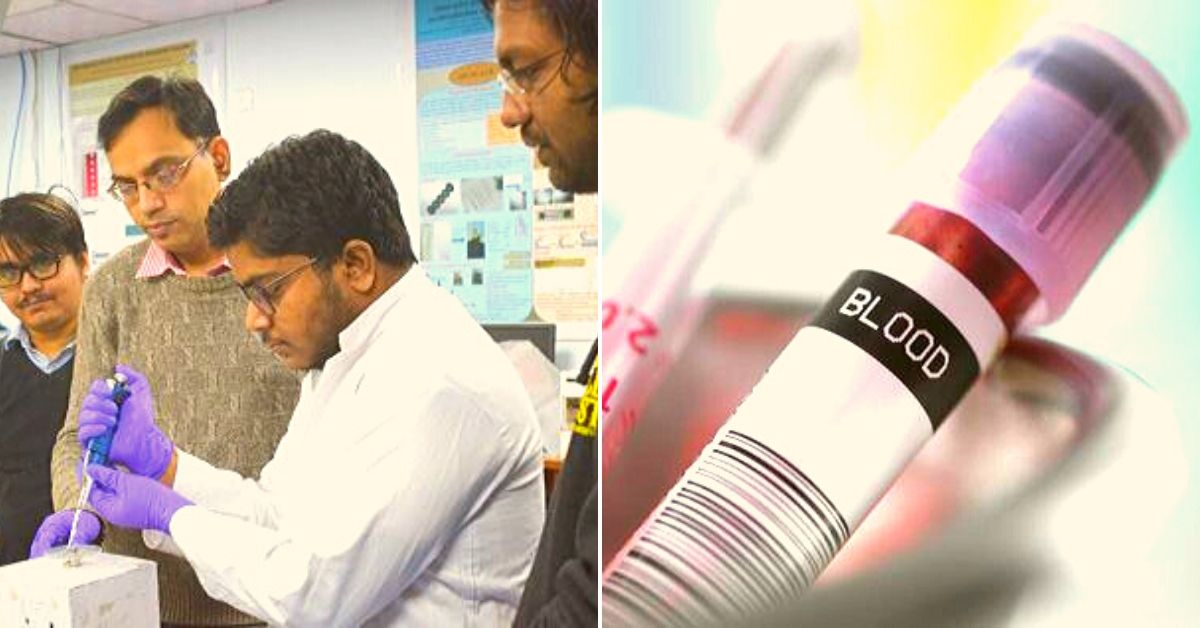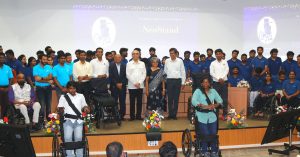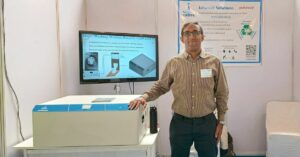IIT Kharagpur Invents Device To Do Complete Blood Count Tests For Rs 10!
Currently costing between Rs 200-250, Complete Blood Count (CBC) is a collection of the most commonly required blood tests, which can detect a wide range of diseases, from common fever to cancer. #IIT #Innovation

Conducting a simple Complete Blood Count (CBC), a test measuring several components and features of your blood, one of the easiest ways to evaluate your overall health and detect a wide range of disorders.
Unfortunately, the existing clinical methods are prohibitively expensive for the underprivileged in India, particularly in rural areas because of their lack of sophisticated instrumentation and trained personnel.
Thankfully, researchers from IIT-Kharagpur’s Department of Mechanical Engineering, led by Professor Suman Chakraborty, have developed a low-cost motorised spinning disc kit that can bring down the cost of one CBC test to about Rs 10.
“The basic principle is straightforward. Different cellular constituents of blood have different densities. So, if you rotate them in a motorised spinning disc they will segregate at different regions based on their density,” says Professor Chakraborty, speaking to The Better India.
“The method exploits the difference in densities of cells for separation in transparent microfluidic channels and implements label-free imaging method for counting the separated cells within the microfluidic disc. The device is a simple spinning disc to estimate the parameters such as hematocrit, haemoglobin, red blood cell (RBC), white blood cell (WBC), and platelet counts with an accuracy > 95% as compared to an automated haematology analyser,” notes the research paper written by his team.
In fact, a more elaborate version of this system is a device known as the centrifuge, which is used in pathology laboratories. In addition to being expensive, it requires careful maintenance and sophisticated human resources to run the machine.
The device developed by IIT is a simple polymer/plastic disc, but it follows the basic principle of a centrifuge.
“The major advantages of this device over state-of-the-art include multiple sample testing within a single biodegradable disc, simple design and fabrication techniques, potential automation thereby making it portable and eliminating the need of trained personnel, and most significantly, eliminating any need for downstream processing of the separated blood. These results may turn out to be of immense consequence towards developing novel point-of-care haematological analysers for resource-constrained settings,” adds the paper.
You don’t need a sophisticated technician or doctors, but any ordinary health workers trained to prick the fingers and take a drop/sample of your blood.
“All these inventions are intended for rural healthcare, where you do not have doctors, sophisticated pathological labs or technicians. Instead, you can train local people and empower them to utilise this medical device. However, once the results arrive, the objective is to send the results through a telemedicine system to a doctor sitting remotely in a city,” says Professor Chakraborty to The Better India.
Since many places do not have doctors, local administrations can establish e-health clinics where local human resources can ensure that the medical data of rural patients is collected on a device like a tablet, mobile phone or computer and then have those results transmitted to a doctor sitting in a major city.
“After reviewing the results, the doctor will give his or her recommendations,” he adds.
Technology development work on the device has been taking place for the last five years, but it took researchers two years to test it in the field and validate the results.
“The device costs less than Rs 10, but when this is commercialised, one might see an increase in costs. Presently, the average cost of a CBC test is around Rs 200-250,” says Professor Chakraborty.
Currently, this device isn’t integrated with a smartphone, but researchers are trying to upgrade it accordingly. With regards to commercial product development and availability, Prof. Suman Chakraborty earlier this month issued a statement on reaching out to MSMEs.
“The Common Research & Technology Development Hub on Technologies for Affordable Healthcare supported by the Government of India’s DSIR aims to support growth and development of precision manufacturing of innovative technologies through MSMEs to reduce India’s massive import in healthcare technologies and their affordability and accessibility. The CBC kit will be a key product which could be licensed and be made market-ready by MSMEs connected to this Hub,” he said.
Low cost, easy to use and manufactured by MSMEs, the CBC kit developed by IIT-KGP researchers could go a long way in furthering access to basic healthcare services in rural India and help homegrown firms stand at the forefront of driving this positive development.
Also Read: Bengaluru Scientist Builds ‘Breakthrough’ Cytotron Device for Cancer Treatment
(Edited by Gayatri Mishra)
Like this story? Or have something to share? Write to us: [email protected], or connect with us on Facebook and Twitter.
This story made me
- 97
- 121
- 89
- 167
Tell Us More
We bring stories straight from the heart of India, to inspire millions and create a wave of impact. Our positive movement is growing bigger everyday, and we would love for you to join it.
Please contribute whatever you can, every little penny helps our team in bringing you more stories that support dreams and spread hope.



















